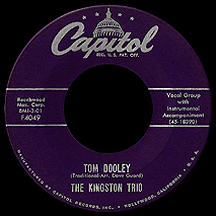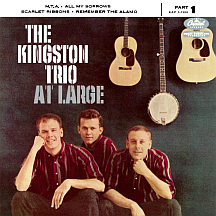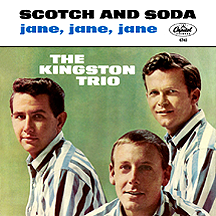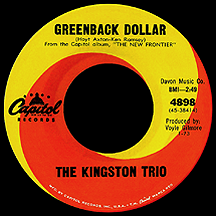THE KINGSTON TRIO
Bob, Dave and Nick of The Kingston Trio have all said, together and on separate occasions, that they were not a folk group. I agree; the wide variety of their music selections over the years attests to it. Yet they are considered the one key act that started the "folk boom" of the late 1950s and 1960s. So, is that really an accurate assessment? You bet it is! Regardless of how one categorizes them, the success of the Trio brought mainstream attention to a previously underserved musical genre. Many of the folk artists of the '60s, and later, have given credit to them for popularizing the form and paving the way for those very acts to achieve their own satisfying levels of success.
Bob Shane and Dave Guard were schoolmates in Honolulu, Hawaii, both having learned to play the ukulele in music class before advancing to guitar and banjo. Nick Reynolds grew up in San Diego and besides guitar he had a propensity for playing conga drums. The three got together in the San Francisco Bay Area when Dave was attending Stanford University in Palo Alto and Bob and Nick were just a few miles away at Menlo College in Menlo Park. They sang, mostly for fun, at college parties and a local hangout or two before Shane returned to Hawaii after graduation in 1956. Guard and Reynolds replaced him with Barbara Bogue and added Joe Gannon to accompany the three on bass. At some point they called themselves The Kingston Quartet and real paying gigs started to come. When Bogue and Gannon developed a romantic relationship and left the group, the remaining two decided they wanted Shane, who had been performing as a solo, to get outta Hawaii and join them for some fun on the mainland.
The Cracked Pot was a small club in Redwood City, a couple more miles up the road from Menlo Park. The Quartet had been playing there to enthusiastic crowds and the originally-conceived Trio carried on where they had left off. Publicist Frank Werber had seen one or two of the foursome's casual, often spontaneous performances some months earlier. When he caught the revised act in the spring of 1957, a tighter, more focused unit retaining a loose, "fun" approach, he decided he wanted to represent them. They hired him as manager, settling on the Kingston Trio as the group's permanent name, partly for the brand of button-down striped shirts popular with Ivy Leaguers (their perceived target audience) and partly for the name's association with Kingston, Jamaica, where the calypso music so popular in the mid-to-late 1950s (Harry Belafonte its main purveyor) originated.
Phyllis Diller had been packing them into San Francisco's basement nightclub the Purple Onion every week since 1955, doing hilarious comedy routines built around her manic housewife persona (with the ever-present long cigarette holder). Timing couldn't have been better for the Trio when she abruptly canceled her engagement and they were hired to fill in for one week in '57...which extended to more than seven months. Word spread quickly and in early 1958 they appeared at some of the nation's hottest night spots including Mister Kelly's jazz club in Chicago and the Village Vanguard in New York's Greenwich Village. By the time they got back to San Francisco and a high-profile engagement at the Hungry i in North Beach, they were ready to make records.
After considering a few interested record companies, they signed with Capitol Records. Debut album The Kingston Trio (with Purple Onion regular Buzz Wheeler on bass for the session) was recorded in just two days and released in June 1958. While S.R.O. crowds had come from far and wide to see their shows, few at first seemed to be buying the record. The first Trio single, "Scarlet Ribbons (For Her Hair)" (written by Evelyn Danzig and Jack Siegel and already well-known through its inclusion on Belafonte's multimillion selling 1956 album Calypso), was delivered frozen and refused to thaw out (that is, until it became a hit for country trio The Browns in '59). The folk music community seemed scornful of the group; traditionalists weren't fond of their commercial image, while the more politically-minded criticized their neutral positioning. The claim that they weren't really folk singers was a hard point to make, as they were frequenting folk music haunts and had chosen a number of established folk songs for their repertoire. Once a foothold was gained with mainstream listeners, though, the naysayers could say what they wanted. A breakthrough came in the fall with the release of a song called "Tom Dooley."
This traditional folk song, based on a real event involving the 1866 North Carolina murder of Laura Foster by Confederate Civil War vet Tom Dula, and his subsequent hanging for the crime in 1868, would seem rather unusual, if not shocking, subject matter for a hit record. Capitol certainly had no plans to promote it, but after a disc jockey in Salt Lake City started to spin the album track (with requests rolling in and a spike in record sales in that market) and other stations around the country jumped on the bandwagon, the label rushed it out as the Trio's second single. The song hit number one in November and the album went to the top of the charts a week later. 'Hang down your head, Tom Dooley...' became a household catchphrase. In April 1959 at the first Grammy Awards ceremony, the Kingston Trio won in the category of Best Country and Western Performance (there was no Folk music category as of yet). The Trio's success would play a large part in expanding the visibility of the entire genre and they went on to win again he following year in the new category of Best Folk Performance. The song was so big that a movie starring Michael Landon, The Legend of Tom Dooley, was released to theaters in June.
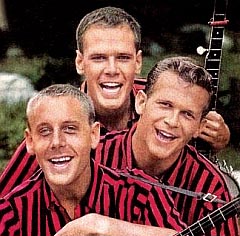
"Raspberries, Strawberries," Will Holt's ode to the Parisian 'girls of the countryside,' was an inexplicably disappointing third single as far as sales go; perhaps the partial French lyrics threw people. Losing no momentum, the group followed with three major hits in 1959. "The Tijuana Jail," written by Denny Thompson, was a bit of strictly-for-fun silliness about a sticky situation, specifically being thrown behind bars for gambling south of the border...with no money for bail. The record was banned in Mexico and San Diego radio stations reportedly weren't too fond of it either. Everywhere else it was a hoot, and that's another way of spelling hit! "M.T.A." had been written ten years earlier by Jacqueline Steiner and Bess Hawes, a rare protest song by the Trio, though not of the sort that would become common a few years later. It challenged the subway fare increase of Boston's Metropolitan Transit Authority with a tale about poor Charlie, who had to ride the train into eternity because he couldn't come up with the extra nickel to get off. "A Worried Man" was a traditional folk song with roots at least as far back as a hit 1930 version by The Carter Family. For many the Kingston rendering is the definitive one.
David "Buck" Wheat had been the regular standup bass player for the group since the second album and he and Bill Loughborough improvised the catchy "CooCoo-U," which became a 45-only release near the end of 1959. The song was a mad slice of mumbo-jumbo with Latin jazz great Mongo Santamaria on congas and Willie Bobo supplying the screams. It barely registered on the singles charts in December, in stark contrast to what was happening at the same time on the album charts, where all of The Kingston Trio's first four albums were in the top ten simultaneously. The group was outselling every other act in music at the time (keeping in mind that this was when Elvis was in the Army and temporarily on a music chart hiatus).
Hits during 1960 included the Spanish opus "El Matador" and "Bad Man Blunder," an old west comedy of errors. The group's arrangement of Harlan Howard's "Everglades" mimics the intro of "Bird Dog" by The Everly Brothers (a hit in '58 at the same time as "Tom Dooley"), giving a nod to Don and Phil by changing the line 'runnin' like a dog through the everglades' in the chorus to 'runnin' through the trees from the Everlys' at the end.
The nation's obsession with folk music was in full bloom by 1961. The Brothers Four had appeared the previous year (sort of a four-man equivalent to the K3) with a smash hit, "Greenfields." The Highwaymen hit number one with "Michael" in September '61. Influential folk originators like Woody Guthrie and Pete Seeger were gaining newfound attention as new artists like Joan Baez and Bob Dylan were just hitting the scene. But Dave Guard wanted out. His vision for the Kingston Trio was as a more traditional outfit. Shane and Reynolds liked things just the way they were, so Guard departed while agreeing to honor performance bookings through November.
John Stewart of The Cumberland Three (like Nick, also from San Diego) stepped right in, doing studio sessions while Dave was still performing with the group on the road. They reasoned he had the right sound and style needed to complement the other two, and the Trio skipped nary a beat. Seeger's "Where Have All the Flowers Gone" was the first hit for the newly-configured band in 1962, a traditional-style folk song interpreted by some as having anti-war overtones. Wheat quit as the group's bassist around this time to join Guard's new group, The Whiskeyhill Singers, and was replaced by Dean Reilly, who recorded and performed with the Trio until the end. "Scotch and Soda," a track from the first album written by Guard (with Shane singing), was the next single release. Stewart composed the follow-up, "One More Town," with Nick singing lead backed by a string section, unusual for a Kingston Trio recording.
1963 started off with a minor aberration: "Greenback Dollar" with its 'I don't give a damn about a...' line as written by Hoyt Axton and Ken Ramsey was edited on the single with a guitar strum in place of the word "damn," illustrating the severeness of censorship circa '63. That little guitar trick actually became a kind of attention-grabber, as if the missing word was really something much more objectionable. It's my favorite Trio song, and I'll take the edited version every time. The next two hits were songs of faith written by up-and-coming singer-songsmith Billy Edd Wheeler. "Reverend Mr. Black," with a "turn the other cheek" message (cowritten with Jed Peters), borrowed the chorus from "Lonesome Valley," popularized by the Carter Family in 1931. The Trio's rendition hit the top ten in May '63. "Desert Pete" delivered a plea of "have faith in thy fellow man" centered around a seemingly-dry well in the middle of a bone-dry desert. The songs were interpreted with such colorful skill by Shane, Reynolds and Stewart as to conjure mini-western movies in the mind.
At the end of 1963, the socially-conscious "Ally Ally Oxen Free" (written by Rod McKuen and Stephen Yates) was the last Kingston Trio single to hit the charts. Their once-formidable album sales took a deep downward turn at the same time. Should we blame the British Invasion for this diversion away from folk music? Nope, can't do that, as Peter, Paul and Mary, Dylan and others yet to come kept folk music going strong. Of course, we've already established that the Kingston Trio was not a folk act. When their seven year contract ended, Capitol passed on giving them an extension and they moved on to record for Decca, but only the 1965 single "I'm Going Home" made any noise and that was slight. Frank Werber focused his attention elsewhere, managing folk-rock act We Five (which included John's brother Mike Stewart), a unique one-girl-and-four-guys group that hit big in 1965 with "You Were on My Mind."
The Kingston Trio called it quits in June 1967 with a two-week stand at the Hungry i, where so much of the excitement had centered nearly a decade earlier. Nick Reynolds left the music business but would later return. Bob Shane released the original version of the Bobby Russell song "Honey," but it was Bobby Goldsboro's later recording that became a number one hit. John Stewart composed "Daydream Believer," a through-the-roof monster for The Monkees, and chronicled America's moon landing with his summer '69 single "Armstrong." In 1979 he had a top ten single, "Gold," featuring vocal and instrumental support from Lindsey Buckingham and Stevie Nicks of Fleetwood Mac.
A recording of a live 1966 Trio show was put on the shelf, eventually seeing release in 1969 on the Tetragrammaton label as Once Upon a Time. "Scotch and Soda" was cycled through yet again, and the live single version received a fair amount of radio airplay that spring, suggesting the guys had gotten back together. In a separate instance at about the same time, Shane reformed the group as The New Kingston Trio with the approval of the others, who declined to participate. In later years Shane, the only surviving member, continued to front a changing lineup (which included Reynolds for several years) on live dates and occasional recordings, well into the 21st century.
NOTABLE SINGLES:
- Scarlet Ribbons (For Her Hair) - 1958
- Tom Dooley - 1958
- Raspberries, Strawberries /
Sally - 1959 - The Tijuana Jail - 1959
- M.T.A. - 1959
- A Worried Man - 1959
- CooCoo-U - 1959
- El Matador /
Home From the Hill - 1960 - Bad Man Blunder - 1960
- Everglades - 1960
- Where Have All the Flowers Gone - 1962
- Scotch and Soda /
Jane, Jane, Jane - 1962 - One More Town - 1962
- Greenback Dollar - 1963
- Reverend Mr. Black - 1963
- Desert Pete - 1963
- Ally Ally Oxen Free - 1963
- Seasons in the Sun - 1964
- I'm Going Home - 1965
- Scotch and Soda - 1969


